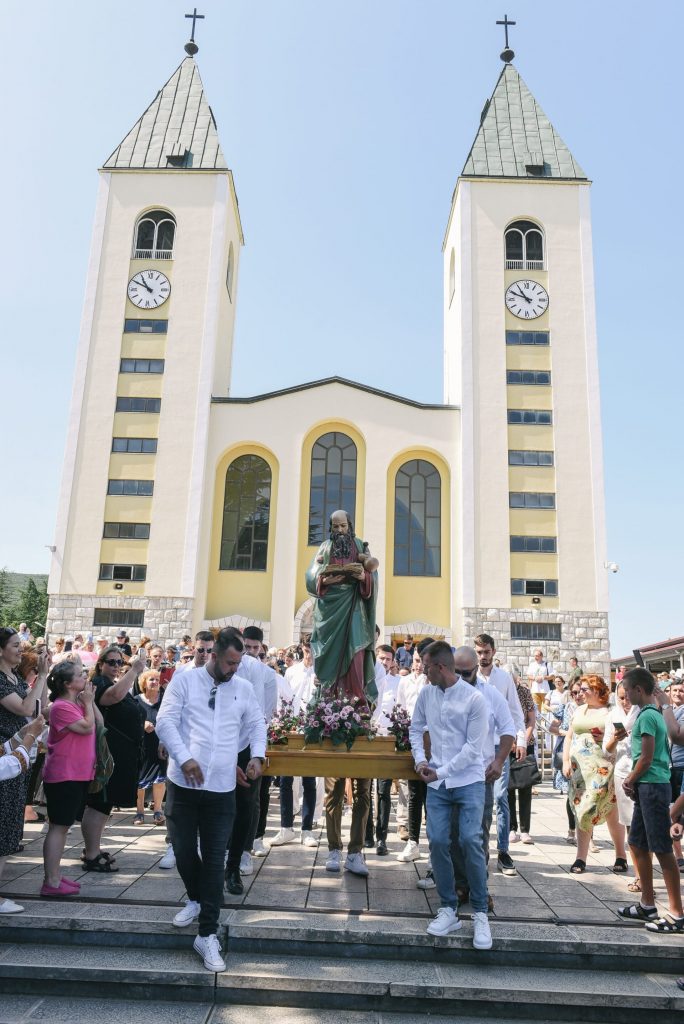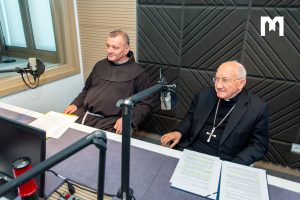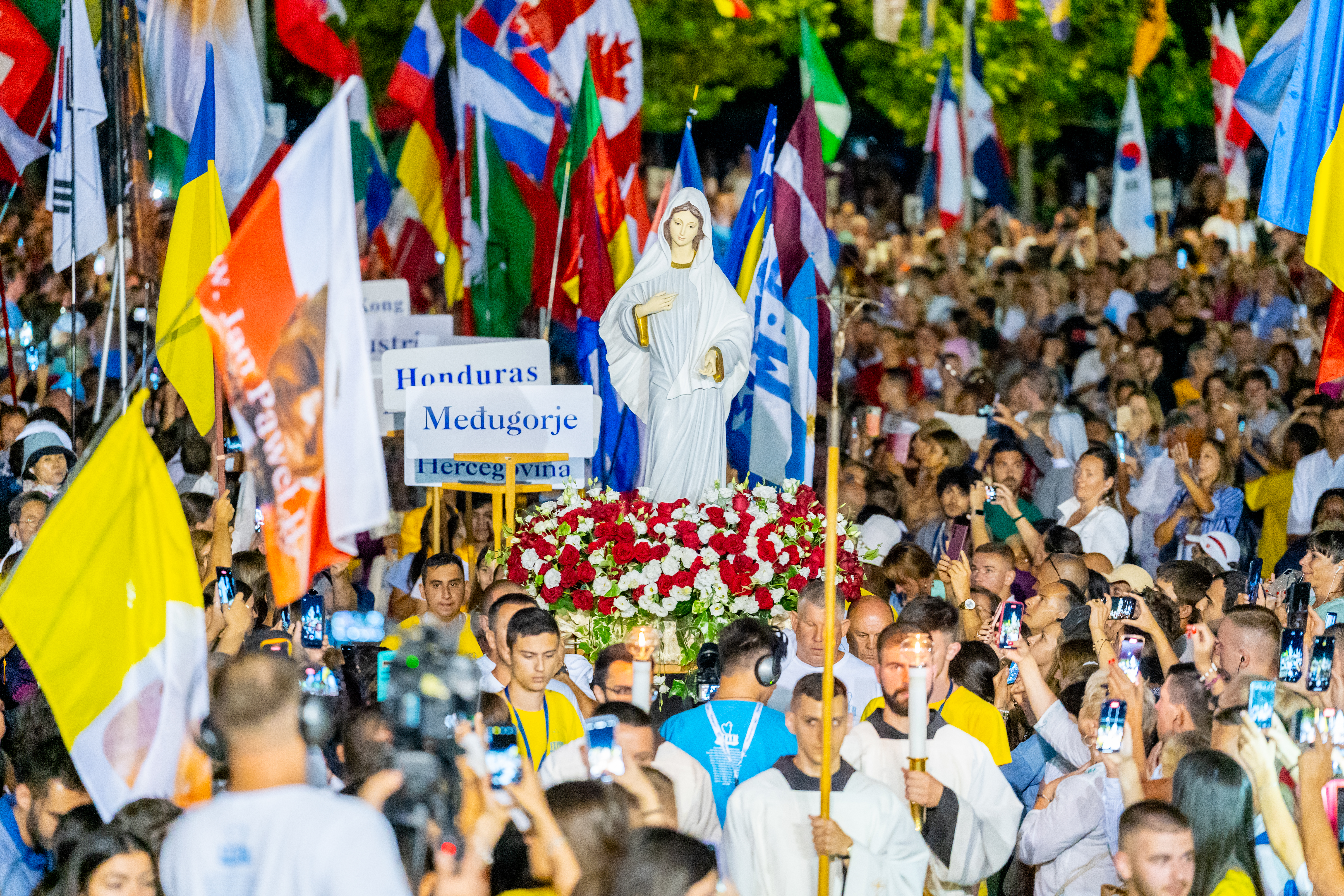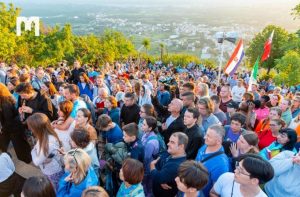
Today is the feast of St. James the Apostle, the patron saint of the parish of Medjugorje. Holy Masses were celebrated in the parish church this morning at 7 and 8 a.m., with the central celebration—the solemn Holy Mass at 11 a.m. in Gaj—being presided over by Mons. Petar Palić, the Bishop of Mostar-Duvno and Apostolic Administrator of the Trebinje-Mrkan Diocese. At the beginning of the Holy Mass, Mons. Palić remarked, “We want to pray today for the intercession of St. James to grant us at least a part of what he carried within himself in relation to Christ: his zeal, sometimes his stubbornness, but above all, his perseverance in following Jesus Christ.” He also spoke about how St. James the Elder became an apostle.
“Jesus approached him and his brother John while they were preparing their fishing nets in the boat with their father, Zebedee. James and John were a special duo; Jesus gave them the nickname Boanerges, or ‘Sons of Thunder.’ Today, we might call them ‘hotheads’ because of their impetuous nature or ambitious character, perhaps also due to their fearless courage and brave hearts. In any case, the two were clearly not passive. Among the Twelve Apostles, James occupies a prominent place, usually following Peter, Andrew, or John. He clearly belongs to the group of favorite disciples whom Jesus introduces more deeply into his own mystery, into his glory that flashes briefly on the Mount of Transfiguration, and into his fear of death that befalls him on the Mount of Olives due to suffering and humiliation. James needed to mature in his faith and learn that true greatness is demonstrated and proven only through a close and intimate relationship with Jesus and His Heavenly Father.
According to tradition, the Son of Thunder, who through his mother Salome asks the teacher to allow him to sit next to him in his kingdom, was active in Samaria and Jerusalem. He was the first among the apostles to suffer the Passion. In the year 44, King Herod Agrippa I had him executed with the sword, as the Acts of the Apostles recount,” said Mons. Palić. He continued, noting that today’s Gospel also reflects God’s humor with our human desires, as everyone wants to present themselves in a more positive light than they are. The mother of Zebedee’s sons, John and James, seeks power for her sons and wishes for them to secure the highest places in the Kingdom of Heaven.
“It is clear what this is about. It is about power. Power here is the goal, and thus the expression of a pathological condition. Jesus opposes this pathological condition. He sees it in its early stages and teaches his disciples about it. It is enough that the rulers of nations oppress the people and that the powerful abuse their authority. This was well known even in Jesus’ time. But let it not be so among you, says Jesus. The words ‘not so among you’ are not merely a statement referring to their specific situation. When Jesus says, ‘Whoever wants to be the greatest among you, let him be your servant,’ he refers to the People of God, whose beginnings are the disciples and who will later become the Church. If there is one statement that stands in the way of many longings and desires, it is this one. Many wish Jesus had never said that. Then they could somehow justify their desires for power, but now there is no escaping the condemnation of the greed for power wherever it exists—in the Church, throughout the country, and at all times, among great and small people,” said Bishop Palić. He emphasized the words of St. Pope Gregory the Great, who first used the term “servant of the servants of God” for the Pope and wrote that no one can learn humility in a high position unless they have renounced pride while in a lower position. Gregory also emphasized that humility should be lived out.
“Humility is an attitude. It is a condition for the proper exercise of power. Anyone who has not learned humility will become a poor authority if given power,” Gregory said. “He does not suggest that there should be no people in positions of power, for if there is no one to manage the government, power belongs to those who have seized it without a mandate. However, power should not be an end but a means. And that is what humility teaches us.
Humility is not about mere restraint. It is something much deeper. Humility is often misunderstood as enduring everything and neglecting one’s dignity. This is not humility, but humiliation! Humiliation means giving up the right to respect and allowing others to hurt us. This is not what Jesus intends, even though he speaks elsewhere of suffering for the faith and being ridiculed for his testimony. Jesus is not talking about an act of self-denial but about being servants. ‘Whoever wants to be the greatest among you, let him be your servant,’ just as the Son of Man did not come to be served, but to serve and to give his life as a ransom for many,” said Bishop Petar Palić. At the end of the Mass, the parish priest of Medjugorje, Fr. Zvonimir Pavičić, thanked Bishop Palić for coming, Archbishop Aldi Cavalli and other concelebrants, and all those who participated in today’s Mass celebration.



